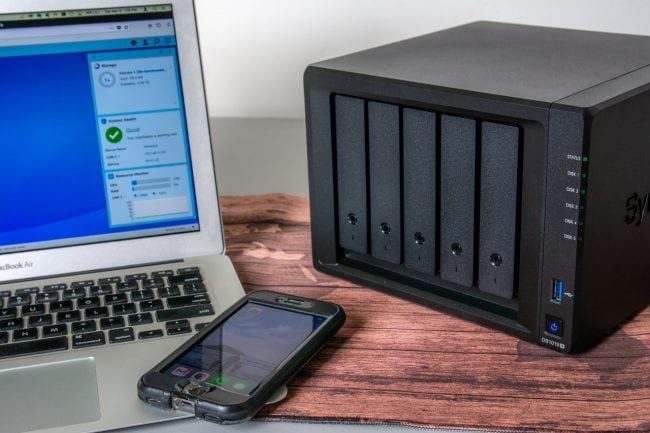- 5 Drive Bays
- Easy Setup thanks to DSM
- Quad-Core Intel CPU
- No 10Gb Ethernet (or abilty to add one)
Final Thoughts

We have looked at a few of the Synology DiskStation units over the past few years and each year we enjoy looking at what Synology brings to the table for an easy-to-use NAS. The DS1019+ is no exception and offers good performance without breaking the bank. If you are a home office or small business looking to add some additional storage or add some extra needed services, the DS1019+ offers a small footprint, with room to grow and some extra power when needed.
Network performance is typical of a Gigabit Ethernet setup. Not many home or small businesses would need the bandwidth of 10GbE speeds so the DS1019+ will keep up to the task for a while. Perhaps an optional PCIe expansion slot would be an option for the next model, as it would help ensure that the DiskStation would grow and scale while the network it was on grew as well.
The 5 drive bays offer good size for storage and the DS1019+ does have the ability to add an additional 5 more drive bays via the eSATA and the DX517 expansion unit. You can make use of a variety of RAID configurations based on your needs or just stick to the SHR or Synology Hybrid RAID mode. The DS1019+ also supports hot-swapping of drives so you do not need to power-down the unit when you need to add or replace drives.
Transcoding is a more specialized operation and the DS1019+ supports hardware transcoding thanks to the Intel Celeron J3455. This allows you to stream high-quality videos to multiple devices without impacting those doing other tasks on the DS1019+ itself.
The Synology DS1019+ proves to be capable of handling the various daily tasks someone might throw at it. The ability to expand up to a total of 10 drives allows for storage growth as your needs increase. The hardware transcoding is very useful to those who wish to stream multiple high-quality video streams to remote devices. The 8GB of RAM is pretty good for a NAS unit of this size, though that maximum is controlled by the Intel Celeron J3455 architecture so you are not able to go above that. The tasks done with the DS1019+ have not seen the RAM usage go higher than 10%.
Overall, if you are looking for a small foot-print, easy-top-setup and maintain Network Attached Storage solution for your home or small business needs, take a look at the Synology DS1019+!

